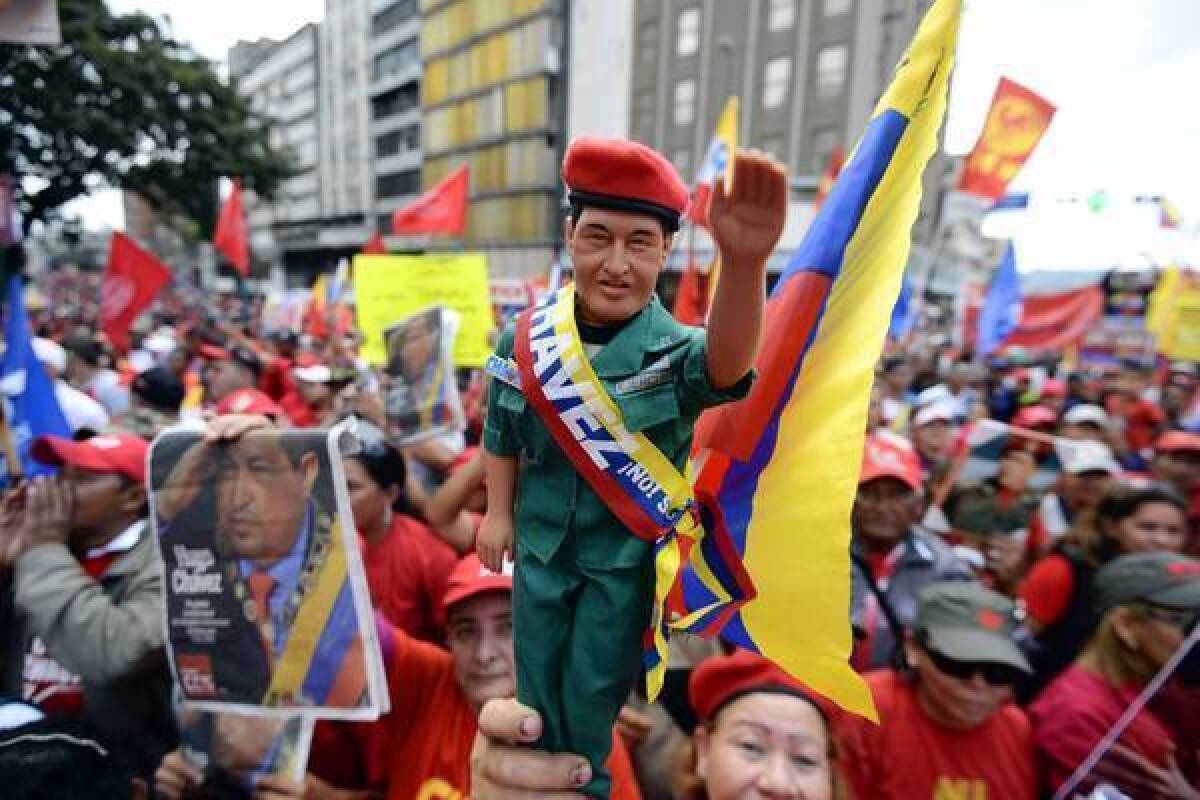Venezuela vice president faces leadership test

- Share via
CARACAS, Venezuela — Venezuelan President Hugo Chavez has kiddingly called Nicolas Maduro “the bus driver” in reference to his former role as a union leader and mocked his voracious consumption of submarine sandwiches.
But the cancer-stricken Chavez, flush from his resounding reelection victory last year, clearly thought highly of Maduro, naming him vice president in October.
Now, with Chavez recovering from surgery in Cuba, Maduro in effect must be taken seriously as the president’s anointed successor.
Thursday was to have been Chavez’s inauguration day, the beginning of his fourth term. Instead, it was a coming-out of sorts for Maduro, 50, who finds himself at least temporarily in charge of this nation of 29 million people.
Tens of thousands of red-shirted Chavez supporters gathered in downtown Caracas for a “non-inauguration” ceremony and heard from the vice president.
“Last night I couldn’t sleep. From 3 or 4 in the morning until daybreak,” Maduro told the crowd, saying one word kept echoing. “Chavez. Chavez. Chavez.”
A succession of foreign leaders, including Nicaraguan President Daniel Ortega and Bolivian President Evo Morales, paid homage to Chavez — and pledged support for Maduro.
Maduro’s position as vice president was confirmed in a Supreme Court ruling Wednesday amid the constitutional uncertainty caused by Chavez’s extended absence in Cuba, where on Dec. 11 the president underwent his fourth surgery for cancer. The National Assembly has granted Chavez an unlimited medical leave.
Maduro has risen steadily through the ranks. The former congressman and National Assembly president is both foreign minister and vice president, as well as Chavez’s designated successor, and in charge of the government at least until the president recovers, resigns or dies.
Maduro, a follower of Indian mystic Sai Baba, has an agreeable personality that has served him well as foreign minister. He has earned a reputation for being open and pragmatic, and helped repair relations with Colombia after the Venezuelan military briefly mobilized border forces during one 2008 dispute.
In November, U.S. Assistant Secretary of State Roberta Jacobson contacted Maduro about the Obama administration’s willingness to reopen relations with Venezuela and received a receptive hearing, according to U.S. government sources.
Maduro and his longtime partner, Atty. Gen. Cilia Flores, who helped spring Chavez from prison after he unsuccessfully led a 1992 coup attempt, make a prominent power couple.
But Maduro is also a committed socialist who shares Chavez’s reverence for the Cuban revolution and its role in Latin American social and political history.
For now, analysts see Chavez supporters falling in behind Maduro in unity and sympathy with their stricken leader and because, in the words of analyst Manuel Sierra, the party has every incentive to stick together. “Things are going so well for the Bolivarian Revolution,” Sierra said.
But challenges lie ahead. Economists say debt-laden Venezuela must devalue its currency and cut federal spending that Chavez jacked up to win votes in October. That could cause friction with the impoverished support base accustomed to heavy government subsidies.
Then there are the May mayoral elections in which Maduro will have to decide whether to continue Chavez’s practice of choosing local candidates from “the top down,” something that chafed local Chavistas no end, said Webster University political scientist Dan Hellinger.
Maduro may also find it difficult to sustain Venezuela’s support for Cuba, which in free oil and commissions could amount to $6 billion a year, according to some analysts.
Retired brigadier general and analyst Francisco Uson said Maduro’s pro-Cuba stance will be weakened by his “lack of standing” with Venezuela’s military, which he described as the “wild card” in any post-Chavez government.
“Cuba’s interference in Venezuela’s affairs doesn’t sit well with the armed forces, and only Chavez with his immense power and prestige could make it tolerable,” Uson said. “So I am pessimistic that Maduro, if he continues with the current policy, can maintain himself.”
Maduro’s chief opponent for power will be Chavez’s former army colleague and now National Assembly President Diosdado Cabello, who because of his strong military connections, will be the “strong man” in Chavez’s absence, Uson said.
Hellinger, however, believes Maduro’s close identification with social welfare programs called Missions and Chavez’s “project to create a communal state” will win him the grass-roots support he needs to keep the reins of power.
Another test that Maduro will face if Chavez dies or resigns is a presidential run against an opposition candidate, most likely Henrique Capriles, who lost to Chavez by a wide margin in October, but who may fare better against either Maduro or Cabello, some pollsters say.
Central University of Venezuela professor Luis Lander said Maduro has yet to prove himself. “How will people react when Chavez is not there to lead? It’s impossible to say. Up to now, Chavismo has been all Chavez.”
Kraul and Mogollon are special correspondents.
More to Read
Sign up for Essential California
The most important California stories and recommendations in your inbox every morning.
You may occasionally receive promotional content from the Los Angeles Times.










